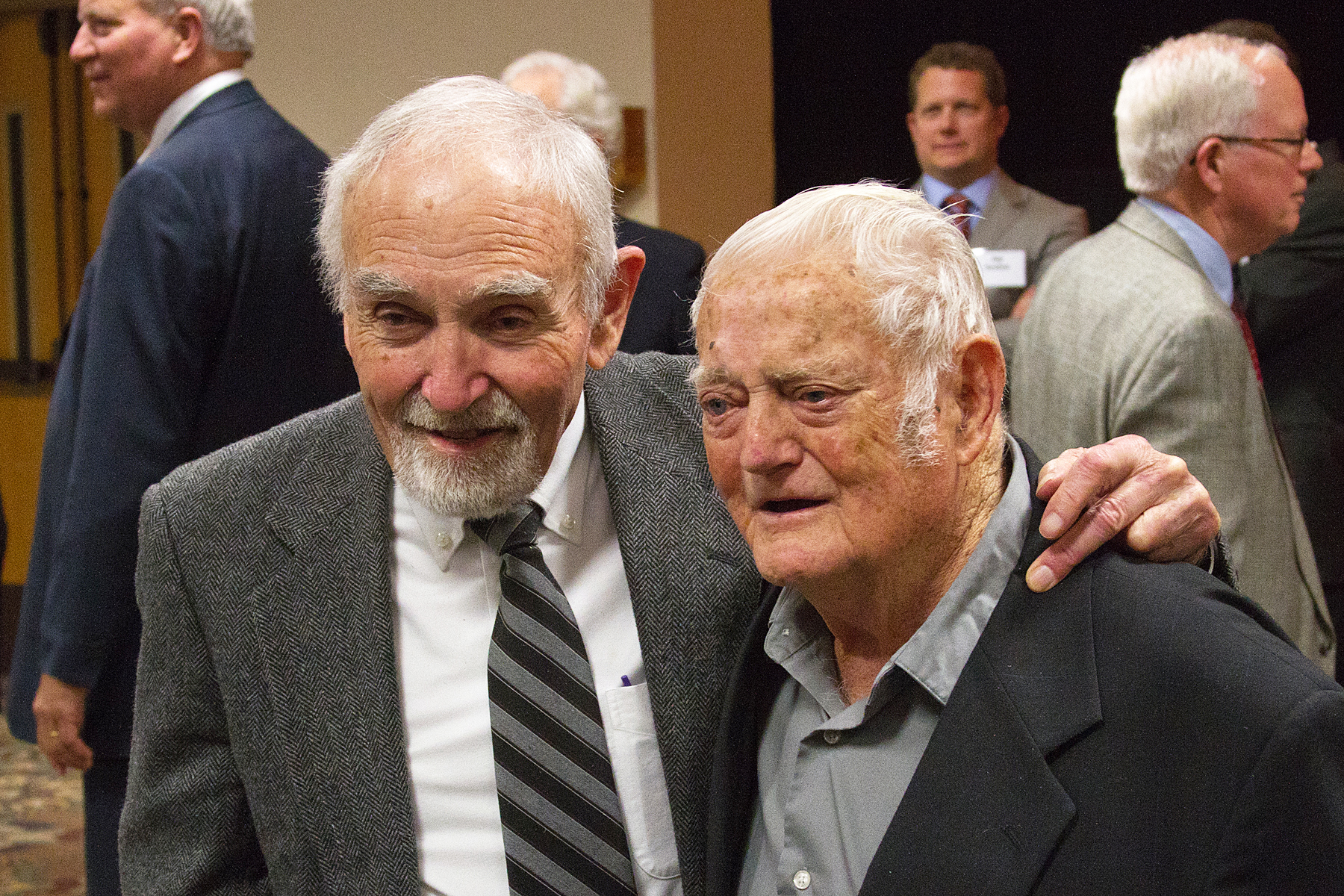Brown, Greer discuss coverage of infamous murders

Bill Brown (left), former editor and publisher of the Garden City Telegram, and his former reporter, Bob Greer, received congratulations Friday night after Brown was named to the Kansas Newspaper Hall of Fame and Greer received the Clyde M. Reed Jr. Master Editor Award. They sat on a panel Saturday morning discussing how to cover "the big story."
By Kathy Hanks, Hutchinson News
When it comes to covering a crisis, former newspaper editor and publisher Bill Brown said it's best to never have one.
But, when that's impossible, his next best suggestion is to never let it happen on a Sunday, because newspaper staff might not be available.
"They weren't," said Brown, about the day he was at the helm of the Garden City Telegram back in November 1959 when Herb Clutter and three other members of his family were murdered in Holcomb.
It was Sunday and Brown was at church waiting for two of the Clutter children, Nancy and Kenyon, to show up for his class. The local coroner, who was in another room at the Garden City Methodist Church, was alerted to the emergency at the Clutter farmhouse. He grabbed Brown from class, saying they needed to stop at the newspaper for a camera.
Crime-scene investigations were handled differently back then. Brown was one of the first in the home, discovering Nancy and her mother, Bonnie Clutter, shot dead in their beds. His photos of the four bodies being removed from a side door made the front pages of newspapers nationwide the next day.
Brown was speaking Saturday morning during the Kansas Press Association's annual meeting in Topeka. Together with Bob Greer, a writer on Brown's staff 54 years ago, they shared memories of how they covered the incident in those pre-technology years.
He also suggested it would be best not to have a notable writer from the East Coast show up writing a book on the crisis. But there was no stopping Truman Capote when he arrived in Garden City, carrying a letter of introduction from the president of Kansas State University. Even Brown's gruffness couldn't inhibit Capote.
"The problem we had," Brown said, "he came in to meet me on deadline and I said, 'I'll be with you when we get the paper done.' " But Capote thought that when he walked in they should stop everything."
"I didn't think Bill was rude; I thought he was extra rude," Greer said, recalling that first newsroom encounter with Capote, who went on to write "In Cold Blood."
When Capote's book eventually came out, Brown wrote a review, saying it was a well-written book, but not factual.
Friday night, Brown was inducted into the Kansas Newspaper Hall of Fame, during the Kansas Press Association's President's Banquet. Greer, editor of the Protection Press, was recipient of the Clyde M. Reed Jr. Master Editor Award. Greer started the newspaper in 1986 after a long career writing for newspapers.
There is so much more to Brown's distinguished career, and many former colleagues and students were on hand to honor him as a journalism instructor and former boss. Before heading to Garden City, Brown was managing editor of the morning edition of The Hutchinson News.
At Kansas State University, where he was known as Mr. Brown, he served 10 years as director of student publications. After retiring in 1981, he moved to London, where he worked on a master's degree. In 1990, the Bill Brown Master Editor Program began, originally endowed by a gift from a former student who wanted to honor Brown, who had a major influence on him when he was a student.
But covering the Clutter murders seems to be what so many are fascinated about when they learn of Brown's career path.
"I almost wish it would go away," Brown said, after the morning session at KPA.
However, he admitted that, 54 years later, time has taken away the edge of that crisis.
